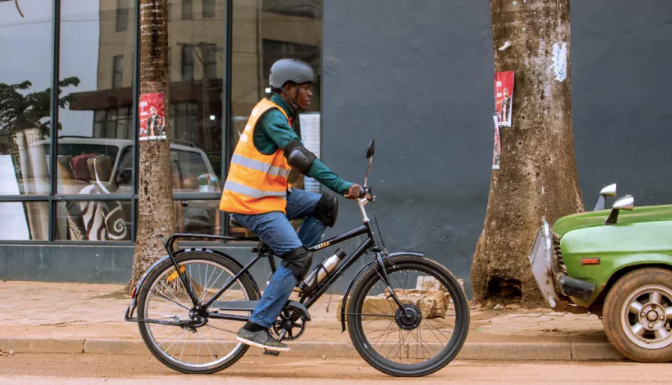How one African country is seeking an electric future
Entrepreneur Geofrey Mutabazi examines how Uganda is seeking to empower a green transition as it seek a path to net zero

Uganda - once described as “Pearl of Africa” by Sir Winston Churchill - prides itself as a tropical paradise, the source of the river Nile and home to the second largest freshwater body in the world as well as the largest percentage of the world’s only wild mountain gorillas.
Today, the world is demanding that Uganda and other African countries perform a ninth wonder, preserve this natural beauty in the name of saving the world from unstable weather, wildfires and other disasters which are the consequence of climate change.
It is as tall an order as the majestic mountain ranges that form the natural boundaries of the country to the west and east, but it can be done. The answer is technology.
While the bulk of greenhouse gas emissions, that are imperiling the planet, may originate elsewhere, the urgency to adopt eco-friendly solutions cannot be overstated for developing countries like Uganda. With economic development now depending in part on oil production, harnessing the power of electric mobility shall be a game-changing strategy that not only decarbonizes transportation, which is a major source of emissions right now, but also promotes sustainable development.
Electric mobility is slowly re-defining the transport sector across Africa. There are over 140 companies pioneering electric mobility solutions on the continent; these include electric buses, motorcycles, and electric bicycles.
According to “The Wheels of Change: Safe and Sustainable Motorcycles in Sub-Saharan Africa” report, electric motorcycles have gained prominence, seeking to decarbonize the 27 million registered motorcycles across the continent. However, the infrastructure required for battery swapping stations is a challenge that demands strategic thinking.
Amidst this electric motorcycle fervor often overlooked and underestimated is the electric bicycle. Electric bicycles require no charging infrastructure, boast straightforward manufacturing processes, and align with an existing high adoption rate. Globally, they are outselling electric cars and plug-in hybrids combined, proving their viability and ease of adoption, as evidenced by reports from InsideEVs and Electrek.
The path therefore to greater eMobility requires dealing with the infrastructure for battery swapping and increasing access to electricity in rural areas for powering electric bicycles.
The former can be quickly attained by mandating all new fuel stations to incorporate electric vehicle charging infrastructure and battery swap stations for electric motorcycles is a practical approach. Additionally, these stations can operate on solar energy, leveraging the existing space frame roof for solar panels. This step can serve as a catalyst for the shift to electric mobility in urban areas.
Meanwhile, in rural areas where electric motorcycles face economic viability challenges due to the high cost of setting up swapping stations and long travel distances, electric bicycles offer a compelling alternative. They can be deployed easily by converting existing or new bicycles with minimal technical expertise. Moreover, charging can occur at household wall plugs or via 120W solar panels, eliminating the need for specialized charging infrastructure.
At Karaa, we are committed to driving this revolution by building custom conversion kits for bicycles and deploying them across various value chains. In Kampala, the capital city we power e-commerce deliveries and food transport with electric bicycles. In rural farming communities, our electric bicycles atransport milk and farm produce. These are pragmatic and accessible solutions that can be swiftly implemented.
We also are in talks to custom build into future planned areas and ecosystem for electric bicycles such as in the planned Kabaale Petrochemical Industrial Park. As a testament to sustainable development, Kabaale Petrochemical Industrial Park can exemplify Africa’s commitment to responsible growth within the transition to net zero.
Through a planned transition to electric bicycles as the preferred mode of transportation, the park shall ensure the sustainability of operations, mitigate emissions, and ultimately advance Uganda’s net zero targets, one enabled by the new oil and gas exploration in the country that will end decades of energy poverty. In the emerging urban centers and surrounding villages of Buliisa, Nwoya, and Hoima, the oil producing areas, bicycles are already a prevalent mode of transportation and can seamlessly transition to electric bicycles.
The ease of converting existing bicycles into electric ones aligns with the basic skills available in these communities. Charging from household wall plugs or small-scale solar installations makes electric bicycles accessible to all, even in remote areas where traditional fuel stations are scarce.
Here we have a case for leveraging the strengths of our existing infrastructure, seize low-hanging-fruit opportunities, and propel the shift to electric mobility that the oil companies, the government and the public can and must get behind.
Geofrey Mutabazi is the Co-Founder and CEO of Karaa Africa
Subscribe to Independent Premium to bookmark this article
Want to bookmark your favourite articles and stories to read or reference later? Start your Independent Premium subscription today.

Join our commenting forum
Join thought-provoking conversations, follow other Independent readers and see their replies